It’s Saturday night in the gritty Votanikos industrial district. The entrance to the small Eliart Theater, nestled between underground clubs, apartment buildings and warehouses, is alive with excitement. The crowd is a colorful mix of young expats, students, retirees and curious tourists eager to explore Athens’ winter nightlife from a new angle. Standing in clusters on the threshold, chatting and laughing, they share the familiar camaraderie of a secretive yet welcoming club gathering for a cherished ritual.
Most of them weren’t born or raised in Athens; their paths to Greece are as diverse as their personal stories. But tonight, they’ve all come with the same aim: to laugh.
As the theater doors swing open, the crowd pours inside, settling into their seats beneath the soft, intimate glow of the stage lights. A round of enthusiastic applause greets the night’s first comedian. Another show by the Athens English Comedy Club is about to begin.
Athina Kefalopoulos, a dynamic young actress with boundless energy, steps up to greet the audience. Back in 2019, she had an ambitious vision: to create an English-language stand-up show in Athens. At the time, options for non-Greek speakers seeking comedy were practically nonexistent. When she shared her idea with some of Greece’s top comedians, their enthusiastic response gave her the push she needed: “Go for it, and we’ll perform.”

© Yannis Zindrilis
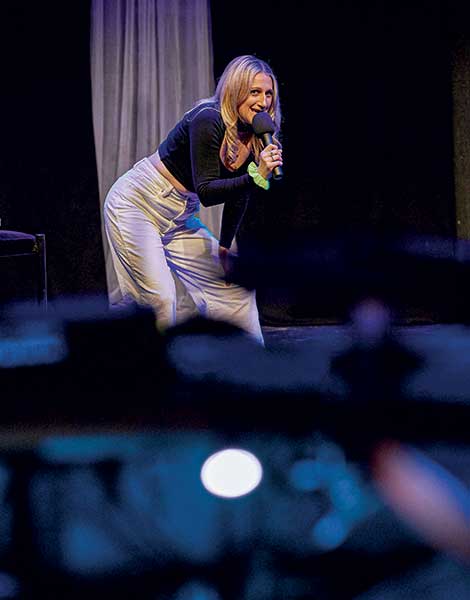
© Yannis Zindrilis
“This is how we’ve made it to our sixth season,” Kefalopoulos says, her face lighting up with a proud smile moments after she steps off stage, having passed the microphone to the next performer. “This place has become a home away from home for many non-Greeks living in Athens. Here, they feel safe. They might see someone from their own country or hear a joke in a language they understand,” she explains.
Her voice softens as she recalls a touching memory from the previous year. An elderly couple from England who attended the New Year’s Eve show. “Some people, like that couple, can’t return to their home countries for the holidays. I’ll never forget them. They lived in Crete and had come to Athens for Christmas. They arrived at the show dressed in their finest. You could see the emotion on their faces – as if they’d found something familiar, something that made them feel like they belonged.”
Kefalopoulos herself is no stranger to living between cultures. She grew up in Russia, Scotland, Norway, and Sweden. “For breakfast, I eat snow,” she joked during her set earlier, poking fun at her nomadic upbringing. After finishing her studies in Scotland – where her sociology degree cleverly masked her true passion for acting – she returned to Greece and began collaborating with local comedians, producing shows in Athens.
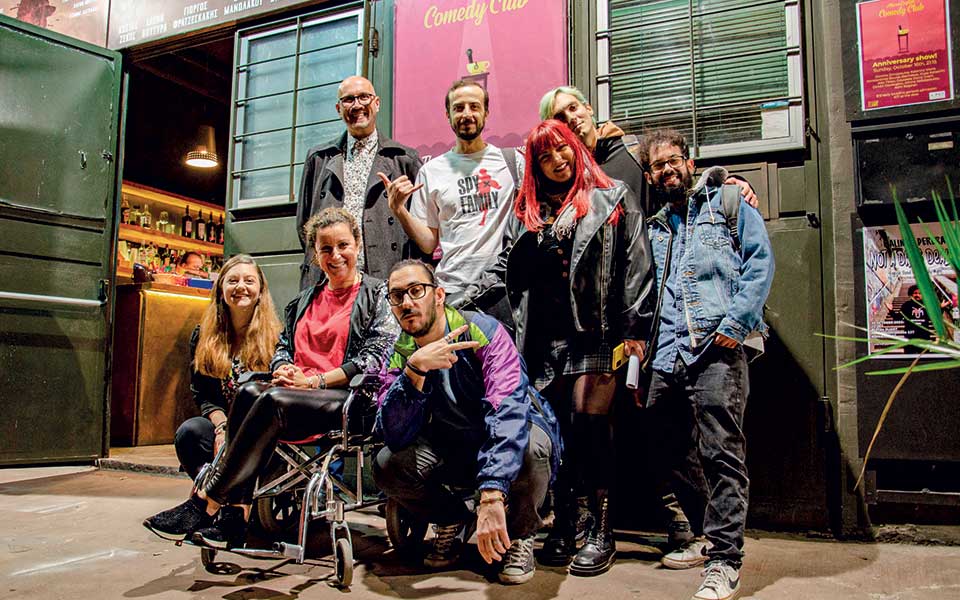
© Yannis Zindrilis
Back then, she never imagined she’d be at the center of a growing international network of English-language comedy clubs one day, pitching performers and hosting comedians from across Europe. “Comedy clubs are like a pack of Dalmatians,” she says with a laugh. “We’re all connected, part of a tight-knit, supportive network that supports artists and opens doors for them.”
Every two weeks, the Athens English Comedy Club transforms Eliart Theater into a place for laughter, drawing a full house of eager comedy fans. Performances come from a vibrant mix of seasoned international touring comedians, bilingual performers and well-known names from Greece’s stand-up scene, keen to test their material in another language. The club also hosts open mic nights, inviting anyone bold enough to grab the microphone and try their hand at comedy. The stand-up audience in Athens has, according to Kefalopoulos, grown significantly in recent years. A large portion of the audience consists of diplomats and other transient professionals, and there’s a steady turnover as each group of nomads eventually moves on.
“After the pandemic, people started watching more stand-up online and on Netflix,” Kefalopoulos says. While headliners such as John Cleese and Daniel Sloss have drawn massive crowds to major venues such as the Odeon of Herodes Atticus and the Christmas Theater, local audiences also show enthusiasm for emerging English-speaking comedians.
“English is a more concise language compared to Greek,” Kefalopoulos notes. “I only need 15 words in English to deliver a joke that would take 23 words in Greek. The rhythm flows quicker, and that makes it easier for the audience to follow or enjoy the humor.”
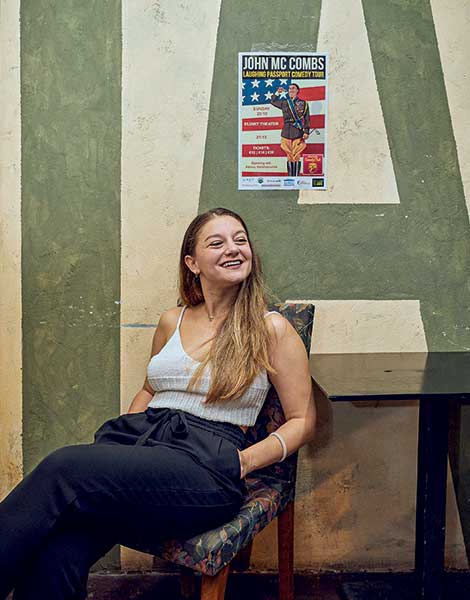
© Yannis Zindrilis
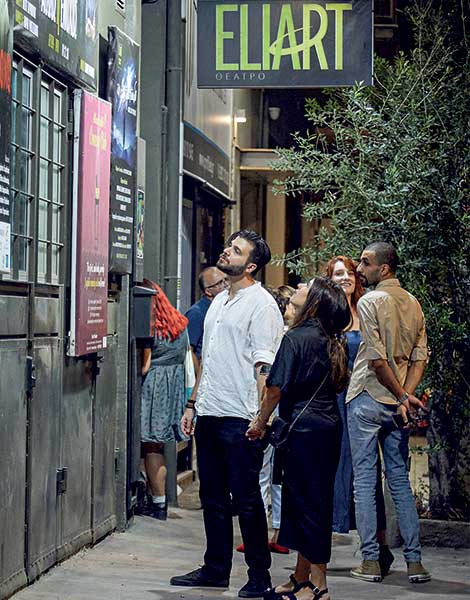
© Yannis Zindrilis
Unfiltered Humor
Tonight, the audience has gathered to see Australian comedian Elena Gabrielle. She takes the stage to warm applause, following a hilarious set by Kynthia, the evening’s second performer, who had the crowd in stitches with her take on the quirks of a classic Greek grandmother. The relatability of everyday Greek life provides endless fodder for humor, and the unique lifestyle of Greeks often serves as perfect icebreaker material for foreign comedians starting their sets.
“It’s 10 o’clock – this is my bedtime. Is this normal for you?” Gabrielle quips, immediately drawing laughter as she launches into a string of absurd yet hilarious anecdotes from her life. Her material boldly confronts those awkward truths we usually sweep under the rug or whisper about to close friends. From stories of awkward sexual encounters, disastrous online dates and catastrophic one-night stands to commentary tackling negative stereotypes about various nationalities, her humor is fearless. She also takes aim at boomers navigating technology for the first time and explores the peculiar things people do when they’re home alone.
For an hour, Gabrielle masterfully pokes fun at sensitive contemporary issues, wrapping them in sharp, nuanced humor that feels distinctly fresh in the English language.
“I have performed in 67 countries,” she tells me after the show, once she’s greeted fans eager to chat with her. “I love Athens. I love performing here. Everyone is so loud and having so much fun. It’s a different style of comedy – a different kind of vibe – compared to places like Germany. In Greece, people laugh more when I’m more animated and act things out. Everywhere I go, people laugh at different things, and I love that.
This is my third time here – I did shows in 2018 – but I’ve definitely noticed how much English stand-up has grown in Athens since COVID.”
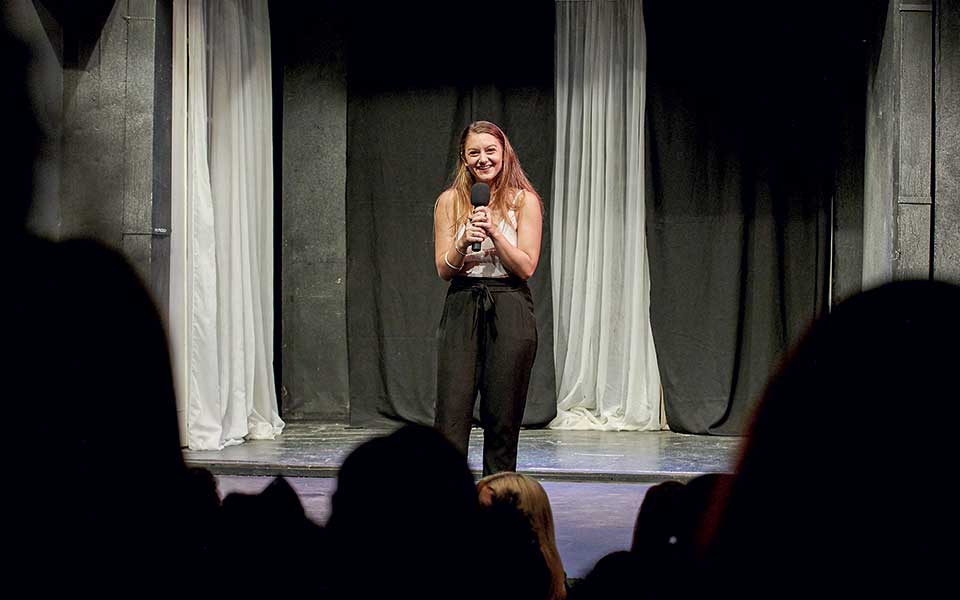
© Yannis Zindrilis
I ask the comedian if she ever filters her material depending on the cultural sensitivities of the places she performs.
“Religion is a big thing, and I don’t really talk about it,” she admits. “Obviously, in this show, I did a few jokes. I grew up Catholic, so I feel like I can make fun of it – Catholics are the easiest for me to joke about. In India, though, you can’t make jokes about politics or religion; in Hong Kong, you can’t say anything about China – that’s super risky for the club. So, I stick more to dating or family stuff.”
Greek culture is something she’s been familiar with all her life, albeit through the lens of growing up in Melbourne. I ask her which aspect of it provides the most material for a comedian.
“I think it’s the Greek men,” she laughs. “I grew up with a lot of Greek-Australian men, so I get their vibe, and I find it fascinating. But also, the culture and the vibe in Athens – the laid-back way of living – is amazing. I love that about Mediterranean culture, and I see it in Cyprus as well.”
As the show wraps up, Kefalopoulos bids farewell to the audience. Many in the crowd linger, chatting animatedly about the jokes that hit home. People introduce themselves to each other, and some choose continue their Saturday night together in another corner of Athens. Most will return here in two weeks; some might even grab the mic themselves and take a turn on the stage.
“We’ve had people from 36 different countries in our audience,” Kefalopoulos tells me proudly as the crowd drifts out. “You must find a way to make everyone laugh. My goal is to see people from every country in the world pass through here.”












